MercoPress. South Atlantic News Agency
Tag: Argentine currency
-
Wednesday, November 13th 2024 - 09:49 UTC
Milei sees end of currency exchange restrictions on the horizon

Argentine President Javier Milei said Tuesday that his country could be months away from lifting the currency exchange stocks after the National Institute of Statistics and Census (Indec) said October's inflation stood at 2.7%.
-
Tuesday, September 25th 2018 - 06:59 UTC
“Zero chance” Argentina will default on its debt next year, Macri tells bankers and investors
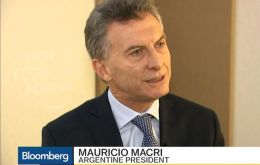
President Mauricio Macri said on Monday that Argentina was close to a deal with the International Monetary Fund to bolster a US$ 50 billion credit line, while a government source said US$ 3-US$ 5 billion in additional funds could be announced this week.
-
Monday, September 17th 2018 - 08:12 UTC
International support for Argentina's general strike against IMF austerity measures
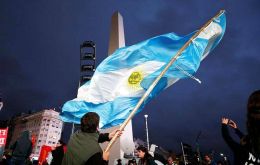
The International Trade Union Conference, ITUC’s affiliates in Argentina, CGT, CTA-A and CTA-T have announced a general strike for 24-25 September in opposition to expected sweeping austerity measures being developed by the government and the International Monetary Fund.
-
Friday, September 14th 2018 - 09:28 UTC
Argentine currency drops to a new record low of 39.90 pesos to the US dollar

Argentina's peso currency fell 3.51% on Thursday to close at a new record low of 39.9 per U.S. dollar, as market confidence ebbs away despite President Mauricio Macri's efforts to reassure investors. Dollar demand had risen on Thursday due to high liquidity sparked by an auction of treasury notes, traders said.
-
Saturday, September 1st 2018 - 09:27 UTC
S&P places Argentina credit ratings under review
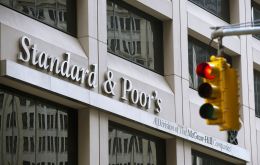
S&P said on Friday it may lower Argentina's long-term foreign currency rating from its current B+ grade, which is four notches below investment grade -- and on par with Turkey, Greece and Fiji. The ratings company cited the risk of worsening creditworthiness and exchange rate volatility as potential threats to the economic adjustment measures undertaken by Mauricio Macri’s administration.
-
Wednesday, May 16th 2018 - 09:09 UTC
Argentina seems to have managed Tuesday's challenge, but what comes next?
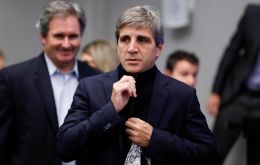
Argentina’s central bank on Tuesday rolled over billions of dollars in short-term debt, providing President Mauricio Macri’s government with a shot of confidence after weeks of economic volatility. In a statement, the Argentine central bank said it refinanced all of the US$ 26 billion of peso-denominated short term bonds that matured on Tuesday. Investors were attracted by renewal rates of 40% for 36-day Lebac and 38% and 38,5% for 90 days and plus, Lebacs.
-
Tuesday, April 12th 2016 - 08:30 UTC
Hero's welcome for Cristina Fernandez in Buenos Aires, where she faces first court investigation
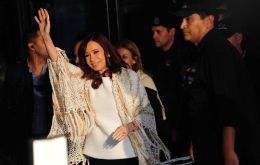
Supporters of former President Cristina Fernandez gave her a hero's welcome Monday night at a Buenos Aires metropolitan airport before she faces a court over her possible role in an alleged scheme to manipulate Argentina's currency.
-
Wednesday, July 22nd 2015 - 06:37 UTC
Dollar in Argentina breaks 15-Peso threshold; pro-business candidate poor showing scares markets
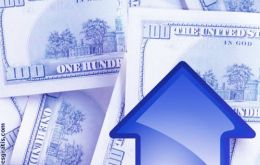
The US dollar kept climbing in Argentina and ended trading on Tuesday above the 15 Pesos threshold after having advanced 30 cents on Monday and 54 cents today. Sunday's electoral result in the City of Buenos Aires where the pro-business PRO party just managed to scrape by with victory, has triggered growing nervousness and speculation among savers and traders.
-
Saturday, February 1st 2014 - 04:58 UTC
Argentina's financial hot summer: record devaluation of the Peso, record loss of reserves

The Argentine currency ended trading on Friday, the first month of 2014, at 8.01 Pesos to the US dollar with an accumulated devaluation in January of 18.63%, the greatest loss in a single month since 2002. However market analysts described the situation as a depreciation 'sustained and managed' by the government of President Cristina Fernandez.
-
Thursday, May 9th 2013 - 04:56 UTC
Argentina: Dollar kept climbing on Wednesday and reached 10.45 Pesos
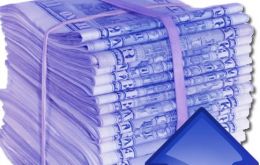
Despite the tax amnesty bill and investment options pledged by the government of President Cristina Fernandez, the dollar kept climbing in Argentina. After breaking the key psychological barrier of 10 Pesos to the dollar on Tuesday, the “blue” dollar which trades on the parallel market climbed again on Wednesday another 37 cents to reach 10.45 Argentine Pesos.
